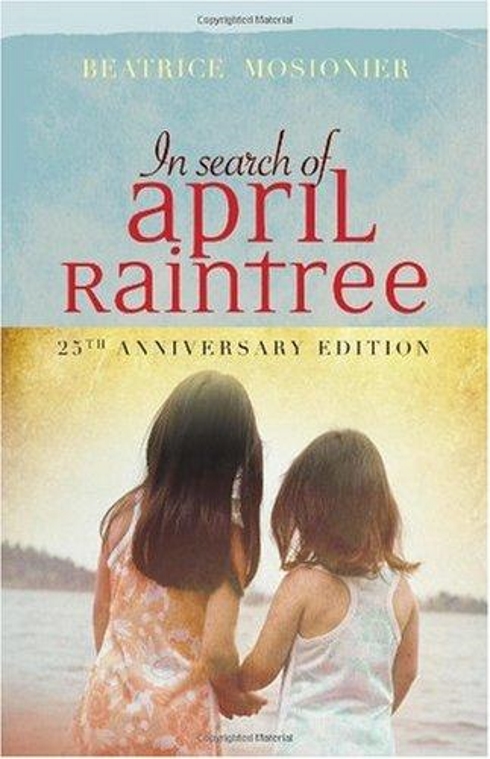Exploring Childhood & Adolescence

In Chapters 1-7 of In Search of April Raintree, the reader experiences childhood and adolescence from the viewpoint of the protagonist April Raintree.
Below are my connections to In Search of April Raintree:
Text to Self
When reading In Search of April Raintree, I found myself admiring April and Cheryl’s relationship. Their relationship reminded me a lot of my relationship with my sisters. As the oldest sibling, I find my self assuming a protector role and it is often a joke in my family that I am my sisters’ second Mom. In this way, I identified a lot with April’s instincts to protect and care for Cheryl and this ability to identify with the protagonist made reading the novel more impactful for me.

I drew this picture to symbolize the relationship between Cheryl and April and highlight the protective role April assumes.
Text to Text
In the first seven chapters of In Search of April Raintree, the reader gets to experience April and Cheryl’s childhood from April’s perspective. Consequentially, the reader also experiences the learning experiences Cheryl and April go through.
The following are some learning experiences that Cheryl and April experience that connect with the content of this course:
- Learning to Write Letters
In the novel, during the time that Cheryl and April are separated their main form of communication is via letter. For this reason they need Guided Participation from adults to complete the task.

Guided Participation: Active engagement in adult activities, initially with considerable direction from an adult or other more advanced individual and subsequently with opportunities for increasing responsibility and independence (McDevitt & Ormrod, 2014, p. 242).
When April and Cheryl first begin writing letters to each other, they are very young and are still learning how to read and write. In Cheryl’s first few letters to April, she writes that she asked for help with the spelling of words and how to write the letter in general. This indicated to the reader that Cheryl is participating in guided participation. As Cheryl grows older, she is able to write her letters with more independence and less guidance. The adults in Cheryl’s life at this time may also provide different forms of Scaffolding to help Cheryl learn to write.
Scaffolding: Support mechanism, provided by a more competent individual, that helps a child successfully perform a task within his or her zone of proximal development (McDevitt & Ormrod, 2014, p. 241)
The types of scaffolding someone may have provided to Cheryl could be giving her feedback on her letter or instructing her on how a word is spelled. The adults that helped Cheryl write her letters would have provided Cheryl with forms of Scaffolding in order for her to perform the task (writing the letter) within her Zone of Proximal Development (ZPD).
Zone of Proximal Development (ZPD): Range of tasks that one cannot yet perform independently but can perform with the help and guidance of others (McDevitt & Ormrod, 2014, p. 237).
By providing Cheryl with Scaffolding, the adults that helped Cheryl assisted her in the learning process by minimizing her ZPD, that being the gap between tasks she can successfully complete without assistance and tasks that she cannot complete without a considerable amount of assistance. As Cheryl learned and grew, her ZPD changed until she was able to write a letter completely independently.
2. Learning Social Expectations and Moral Obligations
In the novel, April experiences many circumstances that help to develop her personal identity and sense of morality. By the time April reaches the end of her childhood it is apparent that she has reached Conventional Morality.
Conventional Morality: Acceptance of society’s conventions regarding right and wrong; behaving to please others or to live up to society’s expectations for appropriate behaviour (Ormond et al., 2010, p. 75).
By the end of April’s childhood she understands how to live up to society’s expectations. This means being a respectable young lady that does not draw attention to herself and allows the adults and men in her life to have control over her. Many of April’s decisions are based on this idea.
When April is living on the farm she seems to be in Kohlberg’s first stage of moral reasoning: Punishment-Avoidance and Obedience.
Punishment-Avoidance and Obedience: Individuals make decisions based on what is best for themselves, without regard for others’ needs or feelings. They obey rules only if established by more powerful individuals; they disobey when they can do so without getting caught. The only “wrong” behaviours are ones that will be punished (Ormond et al., 2010, p. 75).

When April lives on the farm, her actions are guided based on whether she will face punishment for it or not. She knows that she has to complete her chores otherwise she will be punished and she knows that she is supposed to not talk to the other foster children for the same reason.
Text to Others
After discussing the first seven chapters with my group members, I learned that everyone experienced this novel differently and chose to focus on different aspects.
In my reflection, I chose to focus on the relationship between Cheryl and April and discuss specific situations that highlighted Cheryl and April’s development in the beginning of the novel.
From the differences among my group, I understand that there is a vastness in the way Cheryl and April grew up and experienced the world around them. Cheryl and April’s experiences can serve as a reflection to our own personal experiences.

From reading the first seven chapters of this novel I understand the multiple ways in which childhood and adolescence can be experienced. I also now know that these experiences are all opportunities for development. Although Cheryl and April experienced a tremendous amount of hardship, these hardships are the things that determined the type of people they are in the rest of the novel.
References
McDevitt, T.M., & Ormrod, J.E. (2014). Child development and education. Harlow, U.K.: Pearson. (chapter 7, pages 237-262).
Ormod, J.E., Saklofske, D.H., & Schwean, V.L. (2010). Principles of educational psychology. Toronto, ON: Pearson (pages 72-83)